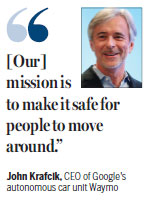Google has self-driving minivans test ready
Waymo, the autonomous car unit of Google holding company Alphabet Inc, will begin test driving self-driving Chrysler Pacifica minivans later this month on public roads in Arizona and California, according to CEO John Krafcik.
Krafcik delivered the keynote address at the AutoMobili-D exhibit at the North American International Auto Show in Detroit on Sunday. AutoMobili-D features companies from around the world that provide products and services in autonomous driving, connected-car technologies, E-mobility and mobility services.
Krafcik said Waymo's "mission is to make it safe for people to move around".
The Pacifica minivans, developed in conjunction with Fiat Chrysler Automobiles, will add to the more than 2 million miles of autonomous vehicle test driving that Waymo has already accomplished though a self-driving fleet that includes Waymo's two-person prototype called the Firefly.

Krafcik said Waymo is developing advanced sensor technology that will make self-driving vehicles safe for use in just about all conditions. He noted that Waymo has reduced the cost of Lidar, which scans for obstacles by about 90 percent from its $75,000 level of a few years ago.
"We're serious about creating fully self-driving cars that can help millions of people, and to do that we have to oversee both the self-driving software and the self-driving hardware," said Krafcik, who formerly was the CEO of Hyundai Motor America.
Krafcik, who believes that autonomous vehicles will appear much sooner on US roads than just about everyone expects, said self-driving vehicles will make driving safer and more efficient.
"We're serious about creating fully self-driving cars that can help millions of people, and to do that we have to oversee both the self-driving software and the self-driving hardware," said Krafcik, who formerly was the CEO of Hyundai Motor America.
Krafcik, who believes that autonomous vehicles will appear much sooner on US roads than just about everyone expects, said self-driving vehicles will make driving safer and more efficient.
Earlier, Chris Thomas, a founding partner of Fontinalis Partners, a Detroit- and Boston-based venture capital fund, said next generation mobility could affect virtually everyone in the world.
He defines next generation mobility as the "efficient movement of goods, services and people across all modes of transportation through new technology solutions."
Examples include autonomous vehicles, car sharing services like Uber and Didi and logistics software that can make air cargo volume more efficient than its 40-45 percent level.
Thomas said China is already a participant in next generation mobility development and said the country can use this technology to address its pollution problem.
"New mobility solutions will decrease congestion which will help with pollution and I think it will be transformational as the technologies are deployed," he said.
Thomas said his firm hasn't made any investments in Chinese companies yet.
"But China is a possibility in the near future," he said.
paulwelitzkin@chinadailyusa.com









